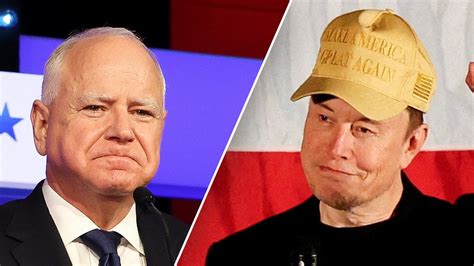
Minnesota Governor Tim Walz delivered a sharp, six-word retort to Elon Musk amid speculation that Musk might relocate Tesla’s headquarters out of the United States, stating, “Good riddance, go be weird elsewhere.” The comment, made via a post on X (formerly Twitter) on Wednesday, has ignited a flurry of debate regarding the business climate in Minnesota and the broader implications for states courting large corporations. Walz’s terse response came after Musk publicly criticized Delaware’s legal system, where Tesla is incorporated, and hinted at a potential move to Texas or Nevada, states with more favorable business regulations and lower taxes. The governor’s pointed remark underscores a growing divide between states prioritizing social and environmental concerns and those aggressively pursuing economic development through tax incentives and deregulation.
The context surrounding Walz’s statement involves a multifaceted discussion on corporate governance, state economic policies, and the increasingly politicized nature of business decisions. Musk’s dissatisfaction with Delaware stems from a court ruling that invalidated his $56 billion compensation package, deeming it unfair to shareholders. In response, Musk floated the idea of reincorporating Tesla in Texas, where he already has significant operations, including the Gigafactory Texas. This potential relocation has spurred numerous states to vie for Tesla’s business, promising various incentives and regulatory advantages.
Governor Walz’s reaction reflects a perspective that Minnesota, with its emphasis on worker protections, environmental sustainability, and higher taxes, may not be the ideal fit for a company like Tesla under Musk’s leadership. His statement suggests a willingness to prioritize the state’s values over attracting corporations solely based on financial incentives. This stance contrasts with that of other states, like Texas and Nevada, which have actively sought to lure businesses with promises of lower taxes and fewer regulations. The contrasting approaches highlight a fundamental disagreement on the role of government in fostering economic development and the balance between economic growth and social responsibility.
The implications of Walz’s statement extend beyond a mere exchange of words. It signifies a broader debate on the future of economic development and the factors that attract or repel businesses in the 21st century. While some argue that states must offer competitive tax rates and regulatory environments to attract investment and create jobs, others contend that a strong social safety net, a well-educated workforce, and a commitment to sustainability are equally important for long-term economic prosperity.
Minnesota, traditionally known for its progressive policies and strong labor unions, has historically taken a different approach to economic development than states like Texas. The state’s commitment to environmental protection, worker rights, and social welfare programs often comes at the cost of higher taxes and stricter regulations. While this approach may not always be attractive to companies primarily focused on maximizing profits, it has fostered a strong sense of community, a highly skilled workforce, and a high quality of life.
Walz’s comments can be seen as a defense of this approach, arguing that Minnesota’s values are not for sale and that the state is not willing to compromise its principles to attract businesses that prioritize profit over people. This position resonates with a growing number of voters who are increasingly concerned about corporate power and the potential for businesses to exploit workers and the environment in the pursuit of profits.
On the other hand, critics argue that Walz’s statement sends the wrong message to businesses considering investing in Minnesota and could discourage job creation and economic growth. They contend that the state needs to be more competitive in attracting businesses and that Walz’s comments are counterproductive to this goal. They also point to the success of states like Texas in attracting businesses and creating jobs through lower taxes and fewer regulations.
The debate over Walz’s statement highlights a fundamental tension between two competing visions of economic development. One vision prioritizes economic growth above all else, while the other emphasizes social and environmental responsibility. The challenge for policymakers is to find a balance between these two competing visions and to create an economic environment that is both attractive to businesses and sustainable in the long term.
The response to Walz’s remark has been varied, reflecting the deeply polarized political landscape. Supporters applaud his commitment to Minnesota’s values and his willingness to stand up to corporate power. Critics, however, accuse him of being anti-business and argue that his comments will harm the state’s economy. The exchange serves as a microcosm of the broader debate over the role of government in the economy and the balance between economic growth and social responsibility.
Ultimately, the impact of Walz’s statement remains to be seen. While it may not deter all businesses from considering Minnesota, it certainly sends a clear message about the state’s priorities and values. Whether this message will ultimately benefit or harm the state’s economy is a matter of ongoing debate.
In-Depth Analysis and Expanded Context
The context surrounding Governor Walz’s terse reply to Elon Musk extends far beyond a simple business relocation discussion. It touches upon several interconnected themes: the evolving dynamics of state economic development strategies, the increasingly politicized nature of corporate decisions, the role of corporate governance, and the broader philosophical differences between states regarding the balance between economic growth and social responsibility.
State Economic Development Strategies: A Shifting Landscape
For decades, states have engaged in fierce competition to attract businesses, often using tax incentives, regulatory relief, and other enticements to lure companies to relocate or expand within their borders. This competition has created a race to the bottom, where states often sacrifice tax revenue and environmental protections in the name of economic growth.
However, there is a growing recognition that this approach may not be sustainable in the long term. Some states are beginning to question the effectiveness of tax incentives and are instead focusing on investing in education, infrastructure, and other factors that contribute to a high quality of life. These states argue that a strong social safety net, a well-educated workforce, and a commitment to sustainability are more important for long-term economic prosperity than tax breaks and deregulation.
Minnesota, under Governor Walz’s leadership, has largely adopted this approach. The state has invested heavily in education, healthcare, and renewable energy, and has maintained a strong commitment to worker protections and environmental sustainability. While this approach may not always be attractive to companies primarily focused on maximizing profits, it has fostered a strong sense of community, a highly skilled workforce, and a high quality of life.
Walz’s statement regarding Musk can be interpreted as a reaffirmation of this approach. He is signaling that Minnesota is not willing to compromise its values to attract businesses that prioritize profit over people. This stance reflects a growing sentiment among voters who are increasingly concerned about corporate power and the potential for businesses to exploit workers and the environment in the pursuit of profits.
The Politicization of Corporate Decisions
Corporate decisions, once primarily driven by economic considerations, are increasingly influenced by political and social factors. Companies are facing growing pressure from consumers, employees, and investors to take stands on social and political issues. This pressure has led to a more politicized business environment, where companies are often forced to choose sides on controversial issues.
Elon Musk, as the CEO of Tesla and other high-profile companies, has been at the forefront of this trend. He has frequently used his Twitter account to express his political views and has not shied away from controversy. His criticism of Delaware’s legal system and his suggestion that Tesla might relocate to Texas are examples of how political considerations can influence corporate decisions.
Walz’s response to Musk reflects this politicization. His statement is not simply a rejection of Tesla’s business; it is also a rejection of Musk’s political views and his approach to corporate leadership. This underscores the increasing tension between businesses and governments that hold differing political and social values.
Corporate Governance and Shareholder Value
The dispute between Musk and the Delaware court highlights the ongoing debate over corporate governance and the role of shareholder value. The court ruled that Musk’s $56 billion compensation package was excessive and unfair to shareholders, arguing that the process by which it was approved was flawed.
This ruling raises questions about the power of CEOs and the accountability of corporate boards. Some argue that CEOs should be given wide latitude to run their companies as they see fit, as long as they are creating value for shareholders. Others argue that CEOs should be held accountable to shareholders and that corporate boards should exercise greater oversight.
Musk’s reaction to the court ruling suggests that he believes CEOs should have more power and less accountability. His suggestion that Tesla might reincorporate in Texas, where corporate laws are more lenient, is a clear signal that he is seeking to avoid scrutiny from shareholders and regulators.
Walz’s statement can be seen as a defense of shareholder rights and corporate accountability. He is signaling that Minnesota values transparency and fairness in corporate governance and is not willing to compromise these principles to attract businesses that prioritize the interests of CEOs over shareholders.
The Balance Between Economic Growth and Social Responsibility
The underlying issue in the exchange between Walz and Musk is the balance between economic growth and social responsibility. Some argue that economic growth should be the primary goal of government policy and that social and environmental concerns should be secondary. Others argue that economic growth should be pursued in a way that is consistent with social and environmental responsibility.
Minnesota, under Governor Walz’s leadership, has generally adopted the latter approach. The state has prioritized investments in education, healthcare, and renewable energy, and has maintained a strong commitment to worker protections and environmental sustainability. This approach reflects a belief that economic growth should benefit all members of society and should not come at the expense of the environment.
Walz’s statement regarding Musk is a defense of this approach. He is signaling that Minnesota values social and environmental responsibility and is not willing to compromise these principles to attract businesses that prioritize profit over people. This stance reflects a growing sentiment among voters who are increasingly concerned about the social and environmental consequences of economic growth.
However, critics argue that Walz’s approach is anti-business and will harm the state’s economy. They contend that the state needs to be more competitive in attracting businesses and that Walz’s comments are counterproductive to this goal. They also point to the success of states like Texas in attracting businesses and creating jobs through lower taxes and fewer regulations.
The debate over Walz’s statement highlights a fundamental tension between two competing visions of economic development. One vision prioritizes economic growth above all else, while the other emphasizes social and environmental responsibility. The challenge for policymakers is to find a balance between these two competing visions and to create an economic environment that is both attractive to businesses and sustainable in the long term.
The Role of Personalities
The exchange between Walz and Musk is also shaped by the personalities of the two individuals involved. Walz is known for his straightforward and sometimes blunt communication style, while Musk is known for his unconventional and often provocative behavior. Their contrasting personalities contribute to the intensity of the exchange and amplify the underlying tensions between their respective positions.
Walz’s concise and direct response reflects his willingness to engage in political discourse and to defend his state’s values. Musk’s public criticism of Delaware and his openness to relocating Tesla demonstrate his willingness to challenge established norms and to use his platform to advocate for his own interests.
The interplay of these personalities adds another layer of complexity to the situation and highlights the challenges of navigating the increasingly complex and politicized business environment.
Frequently Asked Questions (FAQs)
1. Why did Governor Walz respond to Elon Musk with “Good riddance, go be weird elsewhere?”
Governor Walz’s response was triggered by Elon Musk’s public criticism of Delaware’s legal system and his suggestion of relocating Tesla’s headquarters. Musk’s dissatisfaction stemmed from a court ruling invalidating his $56 billion compensation package. Walz’s statement reflects a broader philosophical difference regarding economic development and corporate governance, indicating that Minnesota prioritizes its values (worker protections, environmental sustainability) over attracting corporations solely based on financial incentives. It was a direct and pointed retort expressing that Minnesota might not be the best fit for Tesla under Musk’s leadership given these differing priorities.
2. What was Elon Musk’s issue with Delaware, and why was he considering moving Tesla’s headquarters?
Elon Musk’s primary issue with Delaware centered on a court ruling that invalidated his $56 billion compensation package from Tesla. The court deemed the package unfair to shareholders, citing a flawed approval process. In response, Musk criticized Delaware’s legal system and floated the idea of reincorporating Tesla in a state with more favorable business regulations, specifically mentioning Texas and Nevada. This move was seen as a way to potentially avoid stricter corporate governance and legal scrutiny.
3. What are the potential implications of Tesla relocating its headquarters?
The relocation of Tesla’s headquarters could have significant economic and political implications. For the state gaining Tesla, it could mean a boost in jobs, investment, and tax revenue. For Delaware, it would represent a loss of prestige and potential tax revenue. More broadly, it could signal a shift in the balance of power between states with different approaches to economic development. It can also set a precedent for other companies considering similar moves based on legal and regulatory environments.
4. How does Minnesota’s economic development approach differ from that of states like Texas or Nevada?
Minnesota’s economic development approach traditionally emphasizes worker protections, environmental sustainability, and a strong social safety net, often funded through higher taxes and stricter regulations. This contrasts with states like Texas and Nevada, which prioritize lower taxes, deregulation, and a more business-friendly environment, aiming to attract corporations through financial incentives and reduced regulatory burdens. Minnesota focuses on creating a high quality of life and a skilled workforce, while Texas and Nevada focus on minimizing costs for businesses.
5. What are the different perspectives on Governor Walz’s response?
Perspectives on Governor Walz’s response are divided. Supporters applaud his commitment to Minnesota’s values and his willingness to stand up to corporate power, arguing that it sends a message that the state is not willing to compromise its principles for economic gain. Critics, however, view the response as anti-business and worry that it could discourage investment and job creation in Minnesota. They argue that the state needs to be more competitive in attracting businesses and that Walz’s comments are counterproductive to that goal. The response highlights the broader debate about the balance between economic growth and social responsibility.









